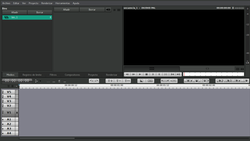| Flowblade Movie Editor | |
|---|---|
| | |
 | |
| Developers | Janne Liljeblad and other contributors. |
| Stable release | |
| Repository | |
| Written in | Python (GTK) |
| Operating system | Linux |
| Type | Video editing software |
| License | GPL-3.0-or-later |
| Website | jliljebl |
Flowblade Movie Editor is a free and open-source video editing software for Linux.
Contents
The project was started by lead developer Janne Liljeblad in 2009 and has been active since. [2] The source code is currently hosted on GitHub.
Flowblade employs a film-style insert editing model as workflow with similar design approach as Avid. In insert editing clips are generally placed tightly after other clips when they are inserted on the Timeline. Edits are fine tuned by trimming in and out points of clips or by cutting and deleting parts of clips.
Flowblade builds most of its functionality using media framework MLT. Other MLT video editors are KDEnlive and Shotcut.
Other used libraries include Frei0r effects and LADSPA. Flowblade supports all of the formats supported by FFmpeg or libav (such as QuickTime, AVI, WMV, MPEG, and Flash Video, among others), and also supports 4:3 and 16:9 aspect ratios for both PAL, NTSC and various HD standards, including HDV and AVCHD.